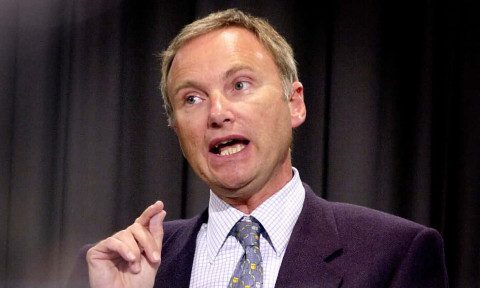
Prof Tony Attwood, an internationally renowned clinical psychologist, was blindsided when he realised his son Will had the syndrome
Will Attwood has been addicted to drugs for the past two decades, an affliction which has seen the 35-year-old jailed multiple times and reliant on support from his family.
His father, Prof Tony Attwood, describes him as “a hero”. It’s a feeling towards his son that has come about since his decision about five years ago to watch an old family video.
Until then Attwood, an internationally renowned clinical psychologist known for his knowledge of Asperger syndrome in children, had been reluctant to look back on the videos of Will as a toddler, a time before addiction and pain.
“They were hard to watch,” he said.
But his daughter Rosie, a teacher to preschool children with autism, convinced him to play one of the videos for her and reminisce. They watched as Attwood appeared on the screen with Will, who was then about four. They were at a beach.
“In the video I was trying to engage with him, and he really just didn’t want to know me,” Attwood said.
“I was giving him all signs of interaction and trying to play with him, and he was basically in a world of his own. It wasn’t shyness, because he knew me. Something more was going on.”
A few minutes into watching, Attwood and Rosie looked at each other in shared recognition of what they were seeing. “He’s got Asperger’s,” they said at the same time.
The world expert on Asperger syndrome had for three decades failed to diagnose the condition in his own son, whose crippling anxiety led him to use alcohol and marijuana when he was a teenager, which progressed into an addiction.
“I realised that I couldn’t make the diagnosis myself because I’m his dad, which would make it hard to be objective,” Attwood said. “And love is blind.
“So I arranged for someone I know and who I very much respect to see him, and she confirmed the diagnosis.”
His son has just finished serving a two-year sentence, and said having a diagnosis made his time in prison easier.
“Previously he was lost in the social world not knowing where he was going, but suddenly he had a road map guiding him about why he felt certain ways and this helped him to understand what he needed to do to cope,” Attwood said.
“Will is now writing a book to help people with Asperger’s cope with prison, as a very high proportion of those in alcohol and drug dependency services have Asperger’s and often end up in prison because of that. So really, I see him as a hero.”
Although Attwood couldn’t help but wonder what might have turned out differently for his son had the diagnosis been made when he was a child, he also knows better than most how scant any research on the condition was back then.
Asperger syndrome, a condition on the autism spectrum, is a developmental disorder that can affect social and communication skills. It is not unusual for those with the condition to be high-functioning, with expertise in a specific topic that can at times be prodigious.
“On one end of the spectrum you have children who are silent, with no speech and poor communication skills and who need a high-level of support in a special school, while on the other end is someone working as a professor or engineer,” Attwood said.
Attwood was just 19 and volunteering at a special school in England, where he was born, when he first encountered children with autism. Back then, the children were described as having “childhood schizophrenia”, even though schizophrenia is a much different neurodevelopmental disorder.
With such a limited understanding about the field, the children were particularly challenging for Attwood at the time. But he knew he wanted to understand them and decided that was how he would spend his career.
More than 45 years later, he is so highly sought after that he can no longer accept patients at his clinic in Brisbane, in Australia, or even manage a waiting list. But he regularly answers questions on his YouTube channel, and tries to make as much of his research available as possible for free on the internet.
His research has taught him that children with Asperger’s should be defined by their strengths and not by their limitations. They are often loyal and dependable; take people at face value and are less likely to label people according to sexist, age-ist, or cultural biases; speak their mind; have a high attention to detail; and are determined to seek the truth, among other strengths. He teaches psychologists around the world to identify and work with these characteristics.
Attwood is focusing his research on women, who are much more affected by Asperger’s than previously thought. Until just a few years ago it was commonly said there were 10 men for every woman with the condition. Now that number is closer to two men for every woman.
While he is well-known for his discoveries in the field and for his work writing “the bible” on Asperger syndrome, Attwood has only now begun to share the story of how the condition has affected his own family. The story will be the subject of an episode of the ABC’s Australian Story airing on Monday.
“Realising that Will has Asperger’s was an intense relief,” he said.
“Before that it was like trying to make a 5,000-piece jigsaw puzzle without the picture, and then suddenly you’re given the picture on the box. I can now explain to him what is happening to him in his language, in ‘Aspergese’.
“I now know he wasn’t trying to be a difficult child and that I wasn’t a bad parent. And when I talk to other parents now, I can tell them I truly understand the genuine feeling of being an exhausted parent.”